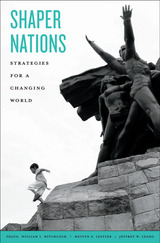
Recognizing the urgent need for students to understand the emergence of the United States' power and prestige in relation to world events, Gary W. Reichard and Ted Dickson reframe the teaching of American history in a global context. Each essay covers a specific chronological period and approaches fundamental topics and events in United States history from an international perspective, emphasizing how the development of the United States has always depended on its transactions with other nations for commodities, cultural values, and populations. For each historical period, the authors also provide practical guidance on bringing this international approach to the classroom, with suggested lesson plans and activities. Ranging from the colonial period to the civil rights era and everywhere in between, this collection will help prepare Americans for success in an era of global competition and collaboration.
Contributors are David Armitage, Stephen Aron, Edward L. Ayers, Thomas Bender, Stuart M. Blumin, J. D. Bowers, Orville Vernon Burton, Lawrence Charap, Jonathan Chu, Kathleen Dalton, Betty A. Dessants, Ted Dickson, Kevin Gaines, Fred Jordan, Melvyn P. Leffler, Louisa Bond Moffitt, Philip D. Morgan, Mark A. Noll, Gary W. Reichard, Daniel T. Rodgers, Leila J. Rupp, Brenda Santos, Gloria Sesso, Carole Shammas, Suzanne M. Sinke, Omar Valerio-Jimenez, Penny M. Von Eschen, Patrick Wolfe, and Pingchao Zhu.

Shaper Nations provides illuminating perspectives on the national strategies of eight emerging and established countries that are shaping global politics at the beginning of the twenty-first century. The volume’s authors offer a unique viewpoint: they live and work primarily in the country about which they write, bringing an insider’s feel for national debates and politics.
The conventional wisdom on national strategy suggests that these states have clear central authority, coherently connect means to ends, and focus on their geopolitical environment. These essays suggest a different conclusion. In seven key countries—Brazil, China, Germany, India, Israel, Russia, and Turkey—strategy is dominated by nonstate threats, domestic politics, the distorting effect of history and national identity, economic development concerns, and the sheer difficulty, in the face of many powerful internal and external constraints, of pursuing an effective national strategy.
The shapers represent a new trend in the international arena with important consequences. Among them is a more uncertain world in which countries concentrate on their own development rather than on shared problems that might divert precious resources, and attend more to regional than to global order. In responding to these shaper states, the United States must understand the sources of their national strategies in determining its own role on the global stage.
READERS
Browse our collection.
PUBLISHERS
See BiblioVault's publisher services.
STUDENT SERVICES
Files for college accessibility offices.
UChicago Accessibility Resources
home | accessibility | search | about | contact us
BiblioVault ® 2001 - 2024
The University of Chicago Press









